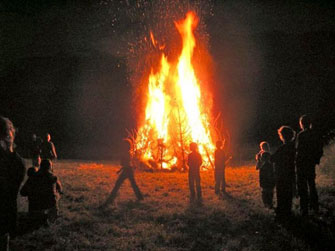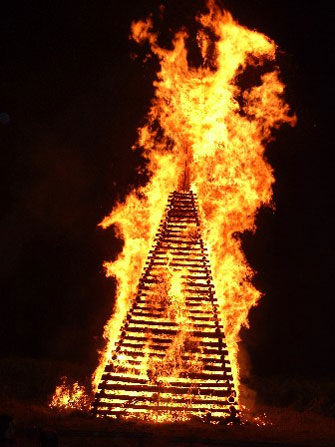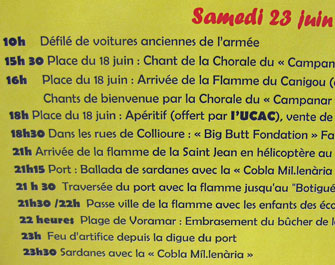
Always striving to break new journalistic ground, this week I have decided to report on an event that I missed. At least this year. The first time I witnessed what is now my favorite French folk custom was about 15 years ago, while I was on vacation in the Lot region of southwestern France.
Nancy and I had rented a house in the hilltop town of Calvignac, and the day we arrived happened to be June 21. As we were moving in, the neighbors, a very friendly retired couple, came over to say hello and informed us that there was a village banquet that night for something called the “Fête de la Saint Jean.”
As I did not know but soon learned, every summer towns all over France celebrate the Festival of Saint John (the Baptist, not the Apostle) sometime around the old dipper’s actual feast day of June 24 — the date varies from place to place and year to year depending on its proximity to a weekend and what else happens to be going on that day.
That night in Calvignac we had no idea what to expect, but, since we also had no food in the fridge, we decided to give it a shot. As it turned out, we had a great time.
The Saint Jean Planning Commission had set up rows of tables and a barbecue pit in the park, and for a flat fee of €10 per head, they were serving a complete dinner, with aperitif, salad, lamb chops, cheese, fruit, all the bread we could eat (which wasn’t a lot) and all the wine we could drink (which was).
I think they lost money on me. In fact, when we were in the area the following year, I happened to notice a poster for the Calvignac Fête de la Saint Jean, and they had raised the price to €13. Probably no connection.
In any case, the food kept coming and the wine kept us going. In the course of the evening we met almost everyone in town, enjoyed talking to almost all of them and were enjoying ourselves immensely. Then at 11pm, it all went up in smoke.
The traditional way to observe Saint John’s Day is to exacerbate deforestation, release greenhouse gases and wipe out endangered moths by lighting a bonfire. And the traditional way to observe a Saint John’s bonfire is from above: it’s considered good luck to jump over the flames, like these revelers in Montoulieu in the Hérault region:

A person jumping alone is supposed to be granted a wish. I for one would wish that someone would invent fireproof underwear.
If a couple takes the (literal) leap together it’s supposed to signify that they’re about to take the (metaphorical) leap as well and get married. Or, if they are already hot and heavy or hitched, it’s supposed to guarantee a large family—presuming that everything comes out the other side unscorched, if you see what I mean (cf. “fireproof underwear,” above).
To my dismay, no one braved the blaze in Calvignac that night, although I can’t blame them. The conflagration in question looked less like that campfire in Montoulieu and more like this towering inferno in Alsace:

Attempts to hurdle it would have resulted in more obituaries than engagement notices.
Despite the potential for third-degree burns, I loved the Saint John’s Feast ’n’ Fire and made a mental note to participate whenever the opportunity arose. Unfortunately, it can only arise in the provinces—there’s no Saint Jean bonfire in Paris. Fortunately, Nancy and I always take a vacation in June.
This year we were in Collioure, a beautiful town down on the Mediterranean coast just north of the Spanish border. One of the first things I noticed upon arriving was that there were posters all over the place for the upcoming Saint Jean festivities.
It looked like quite a program. There were minor warm-up events on Wednesday, Thursday and Friday of that week, culminating on Saturday with a full day of activities, including but not limited to traditional choral singing, traditional dances, distribution of traditional bouquets and children in traditional costumes lighting the traditional fire with a torch that arrives by traditional helicopter (no kidding).
But the strangest and best tradition of all… Well, have a look at the schedule, in particular the line marked “18h30”:

When I saw that the Big Butt Fondation (“foundation” is spelled with no “u” in French) was going to parade through town, my first thought was, “Wow—I need more memory for my camera!”
However, to my acute and lasting regret, I missed it. The Big Butt extravaganza was in the late afternoon, and we had to leave that morning for Pezenas, another beautiful town down there, between Montpellier and Narbonne, where we were going to spend the night.
After checking into our B&B, I bought a local newspaper to see if they were having any Saint Jean shenanigans. And indeed they were: there was a whole article about the festival, from which I learned about yet another tradition.
In that part of the countryside, in addition to pyre-vaulting, Saint Jean celebrants are supposed to bathe at midnight and keep a bottle of the bathwater, which is supposed to protect them against disease in the coming year. This may have something to do with the area’s especially high death rate during the influenza epidemic of 1918, the cholera epidemic of 1832, and every single wave of contagion dating back to the Black Plague.
The article went on to point out that the National Health Service continues to reimburse each resident of the region for the purchase of one bathwater bottle per year, at a total cost to the French taxpayers of €4.3 billion per year.
My interest thus piqued, I turned the page, stifling a snicker of anticipation, to have a look at the schedule. And let out a groan of despair: the Pezenas festival was on Sunday, the day we were leaving to go back to Paris.
So I missed out on the Saint John jollity entirely this year. It’s really too bad. I was hoping that the midnight bathing in Pezenas would turn out to be communal. And that the Big Butt Fondation would make a surprise appearance.
© 2012 Paris Update
FavoriteAn album of David Jaggard’s comic compositions is now available for streaming on Spotify and Apple Music, for purchase (whole or track by track) on iTunes and Amazon, and on every other music downloading service in the known universe, under the title “Totally Unrelated.”
Note to readers: David Jaggard’s e-book Quorum of One: Satire 1998-2011 is available from Amazon as well as iTunes, iBookstore, Nook, Reader Store, Kobo, Copia and many other distributors.
